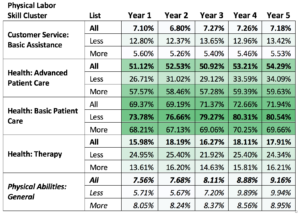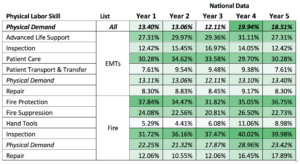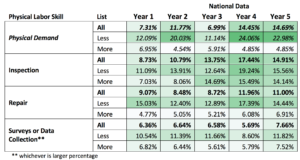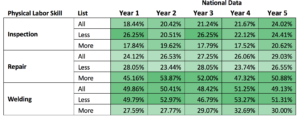Some of our largest growing job sectors are in areas where significant physical demand is required to do the job – most of the trades, lots of applied sciences, etc. If we look for trends from employers as to the required skills, we see that physical demand is becoming more and more important. As American culture continues to gravitate towards less physical leisure time, we are becoming less and less able to perform physical tasks.
Across regions – rural, suburban, metropolitan – we see that these industries are starting to demand more physical fitness than the applicant pools are providing:
- Healthcare occupations across the spectrum: CNAs to Nurses to Social Workers
- Criminal Justice and First-responder jobs in Emergency Medicine, Fire, and Security
- Forestry, Natural Resources, Waste Management and Civic Municipality Positions
- Construction, Welding and other building occupations
Through statistical analysis of online job descriptions, this skills study attempts to quantify aspects of those requirements so that Physical Education & Health curriculum developers for college programs can effectively lobby for inclusion as well as build courses and materials best suited for those areas.
Discipline Areas Where Physical Fitness Is Essential
Some trades in this section didn’t exhibit an entrance or increase in requests for the specific “physical demand” skill, they all have a large portion or a majority of activity that involves non-desk work and very physical in nature. A demonstrably physically fit person with a noted practice in physical fitness and well-being would be a competitive advantage.
Criminal Justice has an emergence of “physical demand” as a top-10 requested skill. Given that these jobs require a high level of at least a few physical fitness features (strength and back flexibility, for example) , this appearance of “physical demand” in job postings at all signals a severe deficit in current candidates and/or current professionals employed in these areas.
For educational purposes, both classroom and practicum in physical exercises and health regimes that support the longevity of someone’s ability to do the work are extremely important life skills for any individual pursuing these careers.
These programs would do well with a Physical Education & Health component, as well as offer a clear competitive advantage over other candidates for the student who was trained in a good system and practiced that system to stay fit.
Data Key:
- Less = Less Training = Jobs that require less training or formal education.
- More = More Training = Jobs that require more training or education.
Criminal Justice
Criminal Justice jobs appear to require a high level of physical agility and strength, but the use of that capacity is largely untapped during the course of a shift. One wants to be prepared to run hard, leap, carry heavy objects or restrain powerful individuals, but that preparation isn’t often used. That may indicate a special regime just for these types of jobs.
The darkening green shows that higher percentages of job postings highlighting physical demand.
![]()
What occupations are in these sets?
- Bailiffs
- Correctional Officers and Jailers
- Detectives & Criminal Investigators
- Fish and Game Wardens
- Loss Prevention Manager
- Police and Sheriff’s Patrol Officers
- Police Detectives
- Police Identification & Records Officers
- Police Patrol Officers
- Private Detectives & Investigators
- Protective Service Workers
- Retail Loss Prevention Specialist
- Security Guards Probation Officers & Correctional Treatment Specialists
- Transit and Railroad Police
Healthcare
Nine occupations all have a core of top skills physical in nature. Those skills are best described in terms of clusters of skills. The cluster names should be self-explanatory, but all involve large periods of standing or walking, carrying, moving people or supplies and equipment that can be, say, 10-50 lbs.
The darkening green shows increased percentages of job postings highlighting physical demand.

What occupations are in these sets?
- Dental Assistant
- Licensed Practical & Vocational Nurses
- Medical Assistants
- Nurse Practitioners
- Nursing Assistants
- Physical Therapist Aides
- Physical Therapist Assistants
- Physician Assistants
- Registered Nurses
First-responders
All these occupations had physical tasks for 6 of the top 10 requested skills across occupations, including naming “Physical Demand” as a top skill. These jobs appear to be more like Criminal Justice jobs where physical capacity needs to be large in terms of speed, strength and agility, but that shifts can go with long periods of no such activity. Sound like the needs of a sprinter or a shot-putter, to you? It does to this analyst.
The darkening green shows increased percentages of job postings highlighting physical demand.

What occupations are in these sets?
- Emergency Medical Technicians and Paramedics
- Fire Inspectors & Investigators
- Fire Prevention and Protection Engineers
- Firefighters, Wildland Firefighters
- First-line Supervisors of Fire Fighting and Prevention Workers
Forestry & Natural Resources
These jobs are characterized by field work where endurance and balance across varied terrains are part and parcel of daily work load. All aspects of the physical labor top skills are expected to be practiced outdoors, unlike our other discipline areas. These jobs usually require a person to carry some amount of equipment into the field strapped on with backpacks and utility belts, say, 20-40 lbs, depending upon what’s required for the task.
The darkening green shows increased percentages of job postings highlighting physical demand.

What occupations are in these sets?
- First-Line Supervisors of Farming, Fishing, and Forestry
- First-Line Supervisors of Logging Workers
- Fish and Game Wardens
- Forest and Conservation Technicians
- Foresters
- Log Graders and Scalers
- Park Naturalists
- Range Managers
- Surveying and Mapping Technicians
- Zoologists and Wildlife Biologist
Welding
Like mechanics, these jobs tend to have heavy lifting as well as body movement across distances as a course of normal activity during a shift. Sometimes a level of quick, fast and strong activity may be required, but not like that required of positions in Criminal Justice or First-responders. As well, backpack-based carrying of equipment isn’t in the physical tasks of these jobs but carrying very heavy equipment across short spaces is and probably is more than the demands of mechanics.
What occupations are in these sets?
- Cutting, Punching, and Press Machine Setters, Operators, and Tenders
- Drilling and Boring Machine Tool Setters, Operators, and Tenders
- Extruding and Drawing Machine Setters, Operators, and Tenders
- Forging Machine Setters, Operators, and Tenders
- Foundry Mold and Coremakers
- Heat Treating Equipment Setters, Operators, and Tenders
- Lathe and Turning Machine Tool Setters, Operators, and Tenders
- Layout Workers
- Metal Workers and Plastic Workers, All Other
- Milling and Planing Machine Setters, Operators, and Tenders
- Model Makers
- Patternmakers
- Plating and Coating Machine Setters, Operators, and Tenders
- Pourers and Casters, Metal
- Rolling Machine Setters, Operators, and Tenders
- Sheet Metal Workers
- Structural Iron and Steel Workers
- Structural Metal Fabricators and Fitters
- Tool and Die Makers
- Tool Grinders, Filers, and Sharpeners
- Welders, Cutters, Solderers, Brazers
Sources: Skills analysis completed between May, 2015 and March, 2018 across industries and occupations through Burning Glass’ LaborInsight data portal that aggregates online job postings.



